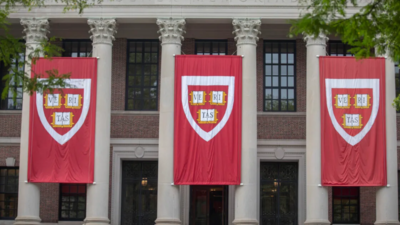Latest Education news – Board Exam Results, Admit Cards, Exam Paper Analysis and Question Papers | Times of India
Harvard University is actively engaging with prominent domestic and international institutions, such as the University of Chicago and the London Business School, to find alternative arrangements for its international students who may soon face legal barriers to remaining in the United States, according to media reports. This urgent initiative arises amid intensifying visa restrictions linked to the Trump administration’s stringent immigration policies. With nearly 27% of its student body coming from abroad, Harvard is racing against time to establish contingency plans to protect its global community and ensure continuity in their education.Facing mounting visa restrictions and administrative blocks, the Ivy League institution is racing against time to create a safety net for its global student population, which makes up approximately 27% of its enrolled body, according to media reports.
Trump’s policy crackdown sparks alarm
The recent wave of immigration reforms under the Trump administration includes a federal ban on Harvard accepting new international students, a measure widely seen as part of a broader ideological campaign against perceived liberal bias and antisemitism in American higher education.In a sweeping enforcement effort, the government has suspended visa application reviews nationwide. Added to this are intensified background checks that now include deep dives into applicants’ social media profiles. Students allegedly involved in protests, particularly those relating to the Israel-Hamas conflict in Gaza, have seen their visas revoked, with some detained by authorities.These actions threaten to undermine the nearly $45 billion in economic contributions made annually by over 1.1 million international students in the United States. The majority of these students hail from China and India, according to figures from the US Department of Commerce.
Colleges mobilize contingency plans
The crackdown has set off alarm bells across the US higher education landscape. Several universities are assessing the feasibility of relocating students to overseas campuses in more visa-friendly countries like Qatar.New York University, Northeastern, and Hult International Business School—institutions with established global campuses—have already expressed readiness to reassign students abroad. Yet logistical complications remain, including disparities in tuition fees, academic rigor, and credit recognition across borders.
Student safety and summer uncertainty
For many international students, even temporary travel could now be risky. Students are increasingly afraid that if they return home during the summer break—even with valid visas—they may be barred from re-entering the US due to the new measures.At Macalester College in Minneapolis, where international students make up 20% of the student population, college president Suzanne Rivera has taken proactive steps. Rivera has launched a fundraising initiative and introduced internship opportunities to help students remain in the US over the summer, according to media reports.
Educators Push Back
The National Association of Foreign Student Advisers (NAFSA), an influential nonprofit dedicated to international education, has condemned the administration’s actions as “an unacceptable assault” on an already rigorous vetting process. In a sharply worded statement, NAFSA warned that the policies are fostering a “climate of fear, mistrust, and confusion” on campuses across the country.International students not only diversify campuses but also contribute intellectually, culturally, and economically. Their dwindling presence would, many fear, strike at the heart of American higher education’s global leadership.
A turning point for global education?
As elite institutions scramble to protect their international students, observers warn that US universities may permanently lose their appeal to global talent. Should visa denials and campus hostilities continue, students might increasingly turn to countries like Canada, the UK, or Australia—nations that are capitalizing on the US retreat by promoting more inclusive education policies.In the short term, Harvard and its peers appear to be managing the crisis through creative stopgaps. But as the political winds continue to shift, the future of international education in the United States hangs in the balance.
#Harvard #scrambles #safeguard #International #students #Trumpera #visa #crackdown #Times #India
